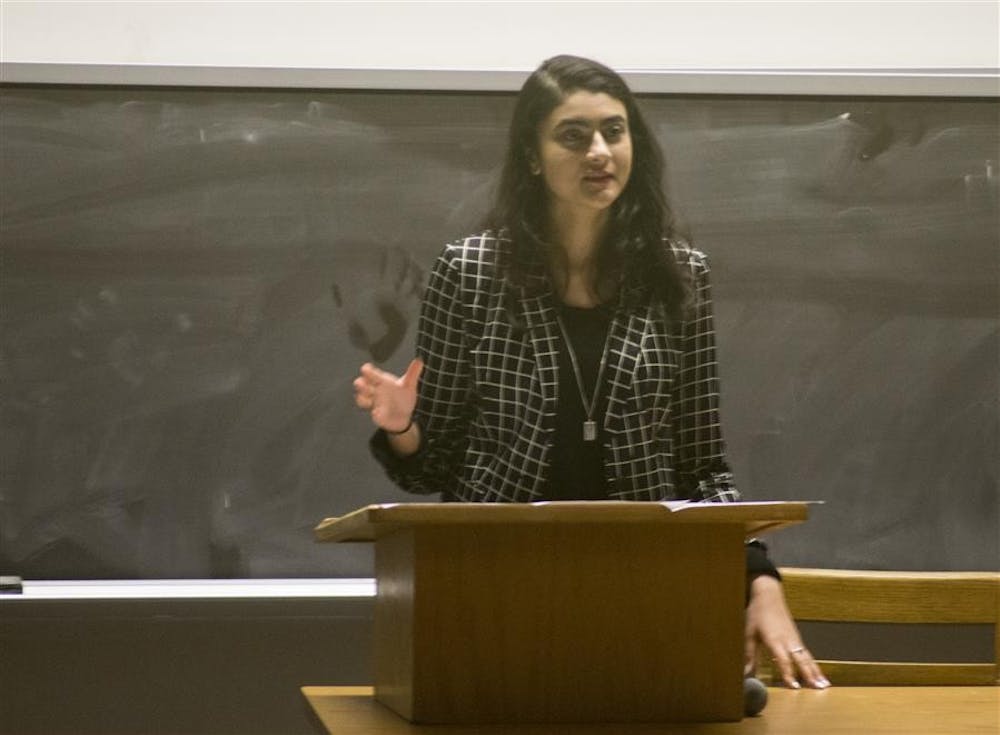Ayesha Siddiqi is sick of news stories about so-called “suffering” Muslim women.
Writer and editor for Buzzfeed and the New Inquiry, Siddiqi urged IU students Friday to rethink how the media frames the dialogue around Islam’s relationship with women.
The event’s goal was to give women, particularly Muslim women, a place to speak on campus and to raise awareness, Muslim Student Union President Romaze Akram said.
“First, we feel like women in Islam is a very misunderstood topic,” Akram said. “Another thing is, I feel like women in general don’t get a lot of exposure on our campus, so I wanted something centered around women.”
Siddiqi addressed how most news media frame stories of Muslim women around their clothing.
She typed “Muslim women” into a Google search. The most common Google searches were clothing, rights and rules. She also showed a survey that asked opinions about the appropriateness of Muslim women’s dress.
“There is no survey about what Christian people should wear,” Siddiqi said. “It’s not something we consider. We make it more about this piece of cloth than the women who remain nameless, faceless and abstract.”
Siddiqi said the narrative of Muslim women’s oppression and needing saved from their
religion is a Western construct.
The media often speak about Muslim women accomplishing basic tasks despite being Muslim, she said.
Headlines about Muslim women often read like, “Muslim woman goes to the store by
herself despite being Muslim” or “Muslim women laughing despite being Muslim, who would’ve thought,” she joked.
She said that way, the media is perpetuating a misconception that’s hard to overcome.
“By saying this, it’s saying being Muslim has to be reconciled with feminism or Westernism or whatever,” Siddiqi said. “I don’t need to reconcile feminism and Islam, when I first encountered feminism within Islam.”
She said she believes the story of Muslim women is static and constrained and urged the crowd not to defend claims that disprove Islam’s oppression of women, but instead to ask who is framing the conversations in that light. Siddiqi argued the idea of oppressed Muslim women was an excuse for war after 9/11 and not actually to protect Muslim women.
She accused western leaders of hypocrisy by justifying war to save women from Islamic oppression when the same leaders were neglecting the women in their own country.
“If I told you every eight seconds a woman is raped and that their death is likely to be brought by a spouse, where would you think that country is? Because we’re living in it,” Sidiiqi said.
She also said the media focuses on only a small portion of Muslim women. Their stories spoken about in America aren’t the experiences of all Muslim women, she said.
“We all know Malala’s name, but what about the girl in Iraq raped and set on fire by a U.S. soldier?” Siddiqi said.
Siddiqi concluded her talk with advice on how to talk about Muslim women.
“If you want to talk about Muslim women, all you have to do is talk to them,” Siddiqi said. “Most women are not just Muslim, and they are not just women. The idea that everything has to be answerable to these two traits is unfair.”
After a question-and-answer session, people were able to talk with Siddiqi personally.
Freshman Sabrena Nayer said she was interested in learning why society only talks about Muslim women in a negative way.
“The best thing I got out of it was concentrating on the media and how they word this topic,” she said. “It’s so crucial to breaking down these barriers and realizing that, whatever your assumptions are, that’s the true veil that’s keeping you from
understanding Muslim women.”
Though Nayer said she sees how the dialogue surrounding Muslim women is harmful to them, she said she thinks it’s also harmful to those who don’t try to look past the stereotypes.
“By telling yourself that any person is so-called ‘foreign’ to you and somehow not appropriate, is restricting yourself,” Nayer said. “It keeps you from developing and
growing.”
Siddiqi discusses issues surrounding Muslim women

Get stories like this in your inbox
Subscribe





